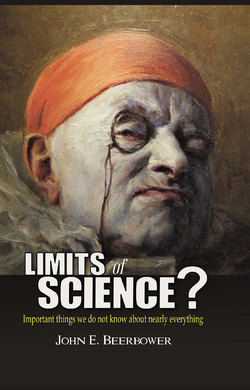Читать книгу Limits of Science? - John E. Beerbower - Страница 38
На сайте Литреса книга снята с продажи.
Is mathematics universal?
ОглавлениеOxford professor of mathematics (and theoretical physicist) Roger Penrose endorses a version of Plato’s mathematical forms, where mathematics exists in a perfect or idealized form external to the world of normal human experience. See The Road to Reality: A Complete Guide to the Laws of the Universe (2005), pp.11–7. Penrose does not claim that mathematical forms “exist” physically, in space or in time, or in some other reality, but that they embody a type of objectivity that is true across cultures and, perhaps, even across of intelligent beings (if there are other such). Id., pp.15, 17.
Penrose makes several interesting points about why mathematics may be relevant to the physical world, some of which I discuss below; but he readily acknowledges that “only a small part of the world of mathematics need have relevance to the workings of the physical world” and that “the vast preponderance of the activities of pure mathematics today has no obvious connection with physics, nor any other science …, although we may frequently be surprised by unexpected important applications.” Id., p.18. Nonetheless, he has also referred to “the mystery of why such precise and profoundly mathematical laws play such an important role in the behaviour of the physical world. Somehow the very world of physical reality seems almost mysteriously to emerge out of the Platonic world of mathematics.” Shadows of the Mind (1995), p.413.
There is a potentially significant difference between the conception of Plato and that of Penrose. Plato’s mathematical forms were conceived as the pure and perfect forms of things that, in a less perfect form, existed in our world. The reflections of the forms with which we interact are only approximations of the pure forms, tainted or distorted by the imperfections of the physical world in which man exists. Thus, we would expect to find that our reality would be similar to and suggested, but not precisely described or defined, by the mathematical forms. Plato’s forms could be thought of as the ideal of, or as epitomizing, the forms we experience. In Penrose’s conception, however, as we shall later see, objective mathematics, where it appears to be applicable to the physical world, is treated as the ultimate truth about or answer to how things actually are. Where our empirical examinations and observations do not provide the complete story, scientists turn to mathematics to derive the conclusions about what was, is and will be. There is little room for recognizing that reality may be a less than perfect reflection of the mathematical forms.
Penrose also does not expressly address (in this work)4 whether the apparent truth of mathematics—and of logic in general—might be a reflection of the structure and nature of the human mind. In fact, in this work, he expressly treats mathematics as having an existence or reality, and a truthfulness, independent of man’s mind (see, e.g., id., p.17) and poses as one of the mysteries to be explained how it is that the mind can comprehend mathematical truth (id., p.21).5
Certainly, some of man’s efforts to communicate with potential extraterrestrial intelligent life have assumed that certain of the mathematical relationships we observe in our physical world (such as the value of Pi) would be recognizable to other beings. It may be that the validity of that assumption depends upon the extent to which the other world inhabited by such beings resembles our world in terms of the geometry of its space. Perhaps it does not. We may wonder further whether there may be differences in the mental processes of other beings that we would concede to be “intelligent” and “self-conscious” that would interfere with our ability to communicate using the pure forms of mathematics.
One can say that Pi reflects an inherent, objective relationship embodied in the geometry of a circle, that is, a numerical relationship between diameter and circumference and between radius (squared) and area. That is a relationship that exists independent of the human mind; or, is it? Is it not possible, to the contrary, that the concepts of diameter, circumference and area, as well as that of the circle, are human constructs and that an alien intelligence might simply not recognize Pi, because it does not recognize the circle?
In fact, one could posit another, different sort of relationship between logic and truth. To the extent that logic and mathematics reflect the inherent characteristics of the human mind, they may not be truly objective nor universal nor, in that sense, independent of the physical world (that is, of the human mind). Apparent consistency between mathematical models and our understanding of the external world could simply be the result of both types of models being human creations. From this perspective, mathematics may not actually be “objective and concrete,” meaning the same to other intelligent life (if such aliens exist) as to human beings. Cf., e.g., Martin A. Nowak, SuperCooperators, p.2 (“universal logic acting on universal rules”).
